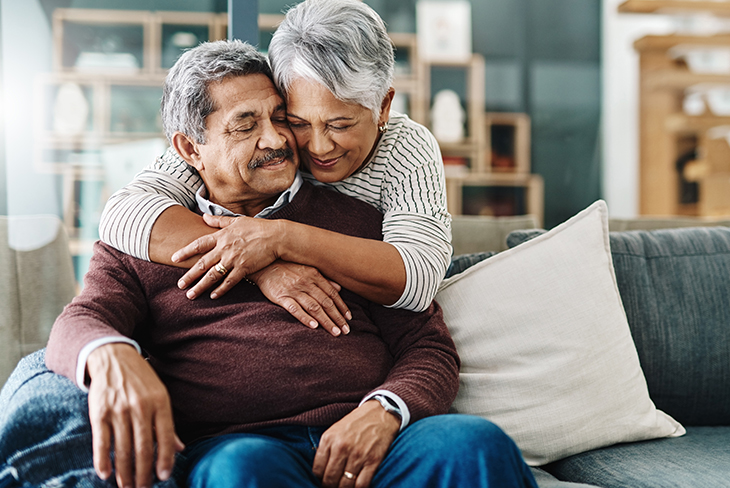Dealing with post-stroke depression

Treatment starts with recognising the signs of depression. This is what you need to keep in mind if you think you or someone you know may be suffering from post-stroke depression.
Post-stroke depression (PSD) is very common and affects nearly one-third of stroke survivors at any one time after stroke. According to an American Heart Association journal article, individuals with depression after stroke are at a higher risk of delayed recovery, poor quality of life and mortality.
Knowing when it’s not normal
‘It is completely normal to experience sadness, a low mood, a sense of helplessness, anxiety, uncertainty, excessive worry, irritability or anger after a stroke. These symptoms would be normal occurring within a period of six weeks after suffering a stroke, but if they persist beyond this period, it’s possible the symptoms have escalated to depression,’ says Mfimfi Mngomezulu, a clinical psychologist at the Life Mental Health Unit at Life Glynnview.
‘The patient might find it difficult to enjoy the things they did previously, have trouble sleeping and lack energy and appetite. There might also be a sense of hopelessness and frustration, and a general feeling of being undeservingly punished.’ Anxiety may or may not be linked to this kind of depression, he explains, but its existence may be incapacitating, rendering a stroke survivor less able to cope with everyday life.
A life-changing event
According to Sandra Laten, a medical social worker at the Life Rehabilitation Unit at Life Pasteur Hospital, a stroke can cause enormous changes in personality, mood and emotions, which in turn impacts the patient’s ability to reintegrate into society. ‘Some patients are highly functioning after a stroke. However, caution is advised. It is imperative to assess the patient’s mental health after a stroke, as well as signs of anxiety – and get the help they need,’ she says. ‘Assessments take place at:
- six weeks (in-patient, while they are in rehabilitation),
- three months,
- six months, and
- annually.
‘These are to identify problems along the road to well-being. The follow-up assessments and interventions are done on an out-patient basis via referral from the rehabilitation unit. Thankfully, these conditions are highly treatable and full recovery, in most cases, is possible.’
Post-stroke depression treatment
Help comes in the form of sessions with a clinical psychologist or a psychiatrist, where medication is prescribed as part of the recovery process.
‘Antidepressant medication and psychological treatments work well together as part of the most effective treatment plan for stroke patients with depression and anxiety,’ explains Dr Anersha Pillay, a psychiatrist at the Life Rehabilitation Unit at Life Riverfield Lodge. ‘Psychological treatment may include interpersonal therapy, cognitive behaviour therapy, behaviour therapy and mindfulness-based cognitive therapy. Lifestyle is also discussed as a means to help patients feel good – eating well and adequate exercise can also positively impact well-being,’ she adds.
Getting help may also come in the form of a caregiver and family support, as well as possible necessary modifications to the home to enable the patient to be able to move about safely, should that be a challenge.
Common post-stroke depression symptoms
Dr Pillay shares the most noteworthy signs and symptoms:
- Drowsiness
- Depression
- Confusion
- Lack of attention
- Anxiety
- Denial
- Apparent clumsiness
- Memory problems
- Difficulty planning and organising
- Abstract thinking and judgment is a challenge
- Lack of self-awareness
- Emotional changes
- Decreased processing speed
Alternative forms of therapy
Mfimfi indicates that other forms of adjustment disorder treatment therapies for recovery may be mentally and physically beneficial:
- Acupuncture: known to help with pain relief
- Yoga and t’ai chi: good for spatial awareness and balance
- Regular massage: can help to improve fine motor skills and circulation
- Aromatherapy: relaxing and reduces stress
- Neurocognitive rehabilitation and music therapy: useful if the problem is of a cognitive nature
- Stroke support groups: instrumental in educating and affording a sharing space for survivors
Talking to someone who has had a stroke
Depending on the location of the stroke in the brain, different abilities in the patient will be affected. Dr Pillay explains that:
The right hemisphere of the brain controls emotions, thinking and spatial orientation, and the left controls language and comprehension skills. ‘It is therefore very helpful as a caregiver to know where the stroke occurred in the brain in order to best communicate with the stroke patient and to try to avoid frustration,’ she says.
Dr Pillay shares these tips:
- Keep the home environment as safe as possible and get rid of clutter and distractions.
- Create a calming environment to help the patient focus and reduce confusion.
- Be patient with the stroke survivor, keeping a normal tone of voice and giving the person time to think about their responses.
Life Mental Health has nine mental health facilities across South Africa. You can get help by contacting a facility near you:
Eastern Cape
Life Hunterscraig Hospital
041 586 2664
Life St Mark's Clinic
043 707 4400
Gauteng
Life Brackenview
010 009 6200
Life Carstenview
011 655 5519
Life Glynnview
011 741 5460
Life Poortview
087 352 2100
Life Riverfield Lodge
087 352 3765
KwaZulu-Natal
Life St. Joseph’s
031 204 1470
Western Cape
Life St. Vincent’s
021 506 5111
The information is shared on condition that readers will make their own determination, including seeking advice from a healthcare professional. E&OE. Life Healthcare Group Ltd does not accept any responsibility for any loss or damage suffered by the reader as a result of the information provided.

